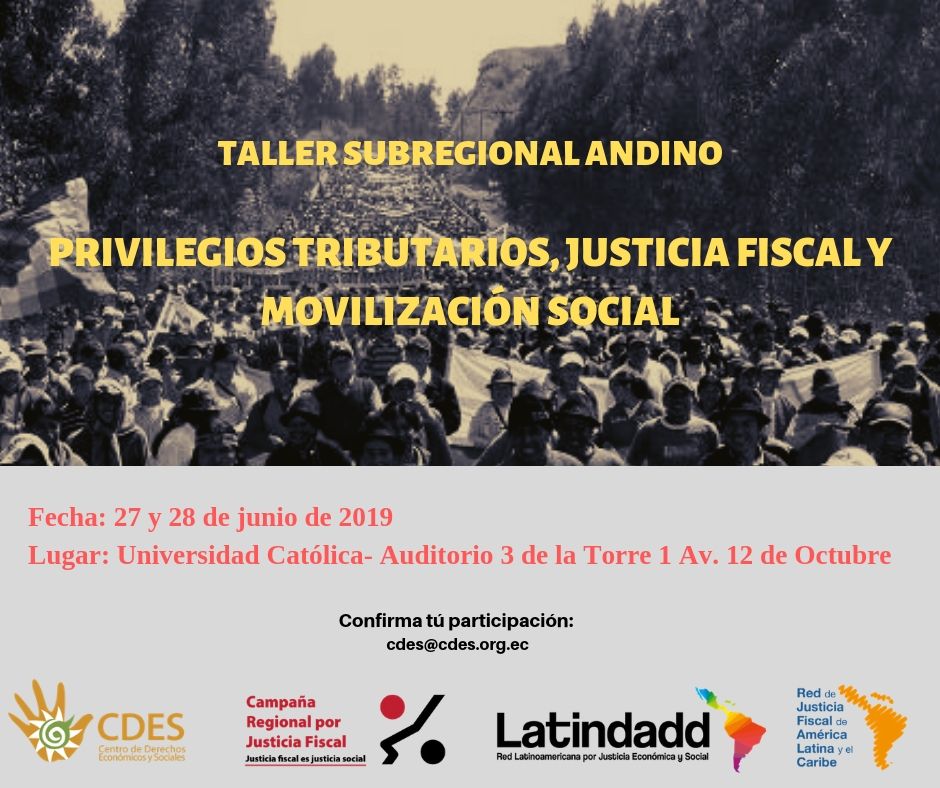Quito, Ecuador hosted the Andean subregional Tax Justice workshop from June 26 to 28, under the slogan “End Tax Privileges ; social mobilization for a greater tax justice” (“Fin de los Privilegios tributarios y movilización social para una mayor justicia fiscal”). This first meeting kicked off the annual regional campaign for tax justice: organized by the Global Alliance for Tax Justice’s regional network member in Latin America, the Red de Justicia Fiscal de América Latina y El Caribe (RJFLAC) and its partner LATINDADD, the Network for Economic and Social Justice, it will run until the end of year under the title “Social Justice is Tax Justice”.
Thist first subregional tax justice activity carried out in Quito marked the launch of the 5th year of “campaign tours” and in this 2019 edition, it focuses on tax privileges and their impact on countries’ tax expenditure.
In addition to social organizations from various areas of Ecuador, there was representation from Bolivia, Colombia and Peru.
The relevance of the gender approach, as well as the need to make information and discussion available to trade union and indigenous movements were the highlights of these working days.
Ecuador’s Center for Economic and Social Rights (Centro de Derechos Económicos y Sociales, CDES) officiated as host and the modality consisted of meetings at two of the most important national universities in Ecuador, where national situations and the regional plan were discussed.
This year, the strategic plan is to call on the participation of civil society, in order to demand that governments provide transparency and control in the granting of tax incentives to transnational companies, as well as their reduction and elimination. “In most cases, we have seen that theses practices fuel an “incentive race” between countries, and that they do not bring the positive results argued and presented with the granting of these benefits: these policies to attract investment through tax incentives do not generate employment, nor do they produce technology transfer. Furthermore, they cause significant expenditure for countries (which cease to receive this income), becoming privileges for a few sectors”, the RJFLAC states.
A bridge between academia, politics and social movements
On June 26, a panel of feminist economists was held at the Central University of Ecuador. Among the major issues highlighted in the interventions, was the possibility that the expense generated by the “tax incentives” may be redirected to vulnerable populations, for unpaid work, for wage gap, for being in charge of domestic economic management and for needing public policies that generate more conditions towards economic equality.
https://www.facebook.com/watch/cdesecuador/
These mechanisms become privileges when they are only intended to boost the profit of large companies and do not promote any popular or social justice benefits; in the case of women, they blatantly deepen inequality.
On June 27 and 28, the subregional workshop “Tax privileges, tax justice and social mobilization” was held.
The first day featured the presentation of the national situations’ diagnoses in the Andean region: national representatives of Bolivia, Peru, Ecuador and Colombia detailed the impact of tax privileges on national budgets.
For instance, Latindadd and CDES just published a new report that analyzes Ecuador’s telecommunications sector, “to delve into the analysis about the ineffectiveness of incentive policies for direct foreign investment.”
During the last day, the workshop was divided into groups to include perspectives from the feminist movement, trade unions and indigenous peoples to the proposals that will be taken in each of the countries.
In addition, a specific workshop on how to think and carry out a campaign in this specific sense was developed. Participants discussed extensively the possibilities of influencing both the media and local politics.
On the other hand, the need to continue expanding the reciprocity link between local and global spaces where the RJFLAC is present via the Global Alliance for Fiscal Justice was raised.
For more information, you can contact Inés Barboza, policy and campaign coordinator of the Global Alliance for Fiscal Justice in Latin America.
